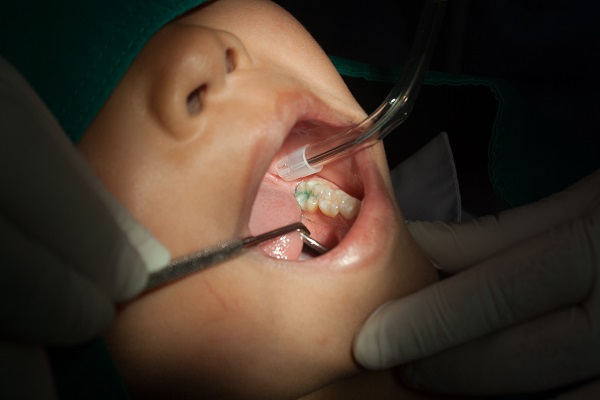When a Pediatric Dental Filling May Be Recommended for Your Child’s Baby Teeth

Even though baby teeth fall out naturally, these temporary teeth still play an important role in pediatric dental health. Baby teeth help ensure that permanent teeth grow in at the proper place and position. As a result, premature loss due to decay can lead to severely crooked adult teeth, as well as digestive and speech issues. For these reasons, cavities should be treated promptly in children of all ages.
Understanding pediatric dental fillings
It is true that most dentists try to avoid any unnecessary dental work on children; it can be difficult to execute and may even be traumatic for younger patients. If tooth decay is discovered in a baby tooth during the early stages, other options may be explored first, along with careful monitoring. However, moderate to severe cavities will likely require a filling.
The problem with cavities during childhood
Tooth decay is incredibly common in young children. A variety of factors can put kids more at risk for getting a cavity, including:
- Thinner enamel on baby teeth
- A diet high in sugar
- The inability to brush and floss properly
- Exposure to high amounts of bacteria
While cavities may seem like a minor dental inconvenience, when left untreated, they can develop into serious problems. Infection and total tooth loss are possible when decay worsens over time. Therefore, most pediatric dental professionals recommend a filling as treatment if the cavity is significant or shows signs of growth.
Other treatment options for baby teeth
Even though a filling is the most common treatment for cavities in children, other alternatives may be used based on the child's needs and dental health history. Early intervention can delay or eliminate the need for fillings, while other options may be required if the decay is substantial.
Minor decay
If a cavity is small and minor, a pediatric dental professional will often recommend careful home care and close monitoring. Using a fluoride toothpaste and adding a fluoride mouthwash to a child's daily brushing routine may keep the decay from spreading. Limiting sweets and flossing carefully can also help. In some situations, a dentist may suggest an application of silver diamine fluoride, which kills harmful bacteria, strengthens tooth enamel, and helps prevent further erosion.
Severe decay
Cavities that have been untreated for too long can weaken the overall structure of the affected tooth. When fillings alone will not be enough, a dental crown may be necessary. Typically, dentists use stainless steel crowns for children, as this option is more durable than porcelain. If the tooth cannot be saved, it will likely be extracted and a space maintainer will be placed in the empty spot. This small appliance helps keep the rest of the teeth in place until the permanent replacement grows in.
Conclusion
A pediatric dental filling is often necessary for moderate to major cavities, even on baby teeth. Other alternatives exist for minor or severe tooth decay. Regardless of the recommended course of action, parents should have a child's cavities treated promptly to prevent serious complications.
Request an appointment here: https://alexoldtowndental.com or call Alexandria Old Town Dental at (703) 763-1078 for an appointment in our Alexandria office.
Check out what others are saying about our dental services on Yelp: Pediatric Dentist in Alexandria, VA.
Related Posts
Regular pediatric dental checkups can help determine if your child needs a dental filling. Kids tend to eat more carbohydrate-rich foods. The starches and sugars tend to feed bacteria in the mouth, making them produce more acids. This results in weak enamel and cavity formation. A dental filling can restore your child’s teeth. If you…
A children's dentist can help set your child up for a lifetime of healthy smiles. Taking children to a dentist for preventative treatments that support their oral health is crucial. Checkups, cleanings, fluoride treatments, and dental sealants are among the most important tools a dentist uses to help keep your child's mouth healthy. Good oral care…
A common pediatric dental issues that parents and children face is thumb sucking. While it's normal for very young children, this practice can be problematic if it continues into the preschool years and beyond. Fortunately, there are ways to eliminate the habit for better dental and overall health.Thumb sucking may seem harmless and even endearing…
A children's dentist typically advises parents to care for their baby's teeth. Some people believe that this is unnecessary because the teeth will fall out eventually. But the baby teeth play a crucial role in the child's development, so it is necessary to take care of them. These teeth are still prone to decay, getting…
